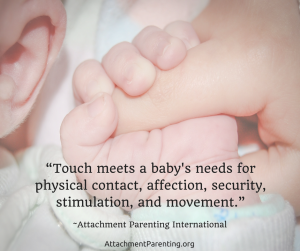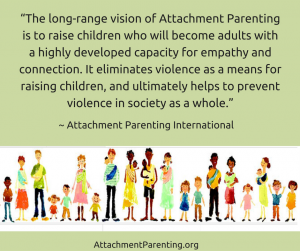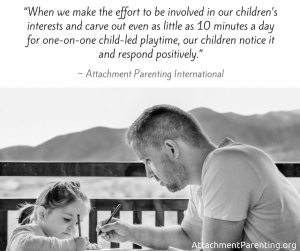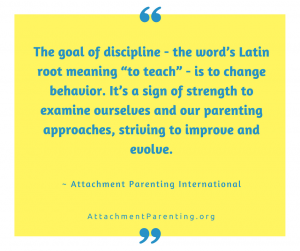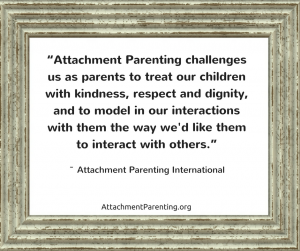Category: Principles
4 tips for cultivating a “yes environment”
 Children hear the word “no” about 400 times a day. Being told “no” constantly doesn’t feel good and often times can be frustrating. The more children hear it, the more likely they are to have tantrums and power struggles, and feel disconnected from their parents.
Children hear the word “no” about 400 times a day. Being told “no” constantly doesn’t feel good and often times can be frustrating. The more children hear it, the more likely they are to have tantrums and power struggles, and feel disconnected from their parents.
Creating a “yes environment” can help families to feel happier and more connected.
This doesn’t mean you must say “yes” to literally everything, or that the word “no” should be nonexistent. It’s important to keep boundaries and to set the limits that are right for your family. The point of creating a “yes environment” is to save the “no” for the occasional vital situations — safety reasons, things that go against family rules, or times when something truly isn’t possible to do.
Here are 4 tips for cultivating a “yes environment”:
- Make sure your “no” is really a no — Sometimes we say “no” to a request before we even really think about it. It’s important to take the time to think before answering children’s requests. For example, Is it really unsafe when my sons are roughhousing? Can I make it safer by removing obstacles from the room and helping them set some ground rules? Or, Do I have the time to do this art project? Am I inclined to say “no” just because I don’t want to deal with the potential mess? There are many times when my children will ask to go the playground, but I simply don’t feel like it and I want to start thinking of every excuse not to go. However, when I try to stay in “yes” mode and give it a try, so often I have more fun than expected. I end up feeling grateful that I chose to have that moment of connection with my children and to say “yes” to adventures and exploration.
- Save “no” for when it matters — When we say “no” all the time, the word loses some of its significance and effectiveness. “No” is a strong word. Our children need to know that it really matters. That’s important both in having them listen to and respect people who tell them “no,” as well as in situations where their own “no” needs to be respected by other people. When we save “no” for the situations that really matter, it makes the word more powerful — our children know that we indeed mean it.
 “Yes…later” — Sometimes your child will ask to do something that would be a “yes” at a different time, like wanting to go to the playground shortly before you need to pick up an older child from school. Instead of saying, “No, we can’t go now. We don’t have time,” you might say, “Yes, we can go to the park after we get your sister from school.” Reframing your words in a positive way, rather than using negative language, is helpful to children.
“Yes…later” — Sometimes your child will ask to do something that would be a “yes” at a different time, like wanting to go to the playground shortly before you need to pick up an older child from school. Instead of saying, “No, we can’t go now. We don’t have time,” you might say, “Yes, we can go to the park after we get your sister from school.” Reframing your words in a positive way, rather than using negative language, is helpful to children.- Explain the “no” — Imagine your toddler is pulling your hair. Your first inclination may be to say, “No!” After all, it hurts, you’re angry, and you want to make it clear that it’s not OK. A more positive way to handle it would be to remain calm and say instead, “That hurts Mommy,” as you move her hand away from your hair. You’re not using the word “no,” but you’re also not allowing the behavior. Explaining it to her in this way will help her understand why you’re stopping their behavior. It also helps develop empathy and gives young children exposure to more language than just “no.”
The long-range vision of Attachment Parenting
Even just 10 minutes a day with our child
Living a life of gratitude, a ‘walking meditation’
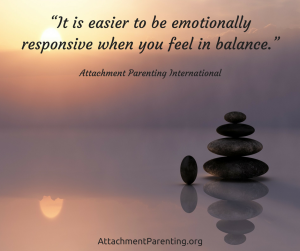 I’m trying to learn not to take anything for granted by feeling grateful for the little things of life, by living and appreciating each moment. It’s not easy to do and it takes a diligent and conscious daily effort — similar to meditation.
I’m trying to learn not to take anything for granted by feeling grateful for the little things of life, by living and appreciating each moment. It’s not easy to do and it takes a diligent and conscious daily effort — similar to meditation.
In mediation, our minds tend to wander. We could call it “monkey mind,” because we are constantly jumping from one thought to another. The act and discipline of meditation is training your mind to refocus on your breathing.
Learning to live a life of gratitude is like a “walking meditation,” being present in the moment, not worrying about the past or the future but really living in the now, feeling intensely grateful for the many blessing we have in our lives.
That doesn’t mean we don’t struggle, that doesn’t mean hurtful things won’t happen, but we can change how we react and perhaps even glean some valuable spiritual lessons.
The holidays always remind us of what is important — our family, our children, the welfare of others, and the beauty of the human spirit. Let’s continue our work together toward a more peaceful and compassionate world by creating peace in our own hearts and families. We may need to forgive ourselves or forgive others in order to begin to move forward. Maybe we need to begin by learning to live a life of gratitude.
May you always stay Attached at the Heart,
 Lysa Parker, cofounder of Attachment Parenting International and coauthor of Attached at the Heart
Lysa Parker, cofounder of Attachment Parenting International and coauthor of Attached at the Heart
The goal of discipline
The AP challenge: Parent with kindness, respect & dignity
10 tips on gratitude
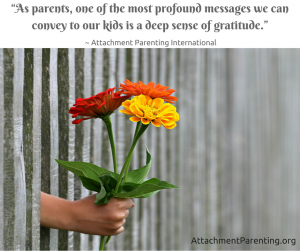 Every year, the Thanksgiving holiday gives us an opportunity to remember to give thanks for the blessings in our lives. API encourages you to make thanksgiving a daily practice. Learning to be grateful for even the most simple things in our lives can change us profoundly, creating overflowing capacity for joy and peace in both our individual lives and our parenting.
Every year, the Thanksgiving holiday gives us an opportunity to remember to give thanks for the blessings in our lives. API encourages you to make thanksgiving a daily practice. Learning to be grateful for even the most simple things in our lives can change us profoundly, creating overflowing capacity for joy and peace in both our individual lives and our parenting.
Gratitude is one of the most-written-about features of Attachment Parenting. Here are 10 tips on gratitude from APtly Said posts through the years:
- “Having a deep sense of gratitude benefits us in developing the ability to savor the pleasant moments in life and preserve through the painful ones.” ~ Effie Morchi, mother of 2 and API Assistant Editor, “Thankful kids“
- “I am grateful for many things big and small, grand and mundane. Today, it is the joyful shriek of my girls running in the twilight.” ~ Leyani Redditti, API Leader and mother of 2, “Gratitude“
- “There is an appreciation for all of us when we take the time to offer our thanks for something that happened during the day.” ~ Lisa Feiertag, API Leader and mother of 2, “Sharing gratitude on a nightly basis“
- “Learning to live a life of gratitude is like a ‘walking meditation,’ being present in the moment, not worrying about the past or the future but really living in the now, feeling intensely grateful for the many blessings we have in our lives.” ~ Lysa Parker, API Cofounder, mother, and grandmother, “Learning to live a life of gratitude“
- “Let’s start right here and right now by mindfully experiencing and expressing gratitude, even in the midst of what might sometimes look like a complete disaster.” ~ Inga Bohnekamp, mother of 1, “5 tips for mindfully coping with chronic illness, for your child and for you“
- “I know that I am so lucky to be a parent, and my days are peppered with gratitude as I watch my son laugh, play, or sleep — ordinary magic moments that make me so thankful.” ~ Yvette Lamb, mother of 1, “For Today, a poem for parents“
- “I feel the magic, love, gratitude, and magnitude in each moment. This love overwhelms me in the most powerful ways. I am truly thankful for being given the greatest role of my lifetime.” ~ Sandy Gordon Frankfort, mother of 2, “Are you afraid to admit the challenges you face as a parent?“
- “I honor each stage of your early development. How blessed we are to spend these days together. My heart fills with gratitude to your daddy who works long hours in the week to make this possible.” ~ Amy Wright Glenn, mother, “A day to live again“
- “Thank you, API, for giving me these wonderful gifts: joy in my parenting and peace in my life.” ~ Rita Brhel, API Leader, mother of 3, and API Executive Editor, “Thanksgiving for joy and peace in my parenting“
- “In awe, my son exclaimed, ‘Mama, the sky! It’s so colorful!’ I turned to him, and seeing his exuberant joy, my heart flooded with deep gratitude. To this day, years later, I still carry those words with me — my son’s gentle reminder to move a little slower, appreciate a little more, and pause long enough to enjoy the moments of delight our days have to offer us.” ~ Kendrah Nilsestuen, mother, API Leader, and API Education & Support Coordinator, “The sunrise of balance“

